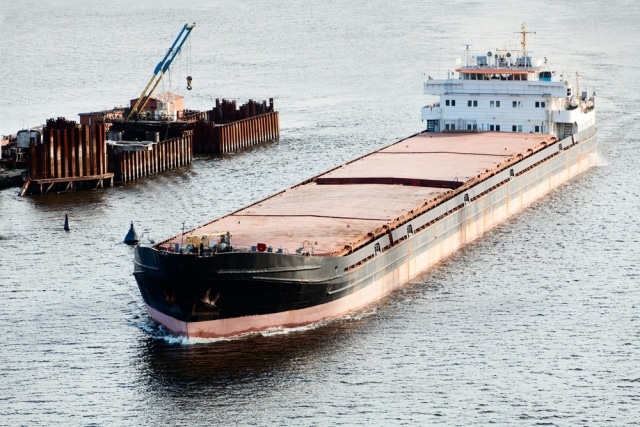The U.S. Coast Guard released plans that would allow wastewater from shale gas to be shipped via barge in the nation’s rivers and waterways on October 30 — and those rules have kicked up a storm of controversy. The proposal is drawing fire from locals and environmentalists along the Ohio and Mississippi rivers who say the Coast Guard failed to examine the environmental impacts of a spill and is only giving the public 30 days to comment on the plan.
Three million people get their water from the Ohio River, and further downstream, millions more rely on drinking water from the Mississippi. If the Coast Guard’s proposed policy is approved, barges carrying 10,000 barrels of fracking wastewater would float downstream from northern Appalachia to Ohio, Texas and Louisiana.
Environmentalists say a spill could be disastrous, because the wastewater would contaminate drinking water and the complicated brew of contaminants in fracking waste, which include corrosive salts and radioactive materials, would be nearly impossible to clean up.
The billions of gallons of wastewater from fracking represent one of the biggest bottlenecks for the shale gas industry.
States atop the Marcellus shale are brimming with the stuff. Traditionally, oil and gas wastewater is disposed by pumping it underground using wastewater disposal wells, but the underground geology of northeastern states like Pennsylvania makes this far more difficult than in states like Texas, and Ohio has suffered a spate of earthquakes that federal researchers concluded were linked to these wastewater wells. The volumes of water used by drillers for the current shale gas boom are unprecedented.
During fracking, millions of gallons of water are mixed with chemicals and sand and blasted into underground shale rock layers to shatter the rock and release minute pockets of trapped natural gas and other fossil fuels like propane or oil. The precise chemicals used in any given well can vary widely, and drillers are not required to tell the public what’s in the specific mix — plus the water picks up corrosive salts, naturally occurring radioactive materials and reactive metals like strontium and barium.
After wastewater returns to the surface from a fracked well, it is collected in large open pits or in tanks. In Pennsylvania, a single wastewater lagoon, the Jon Day Impoundment outside Washington, PA, can hold 13 to 15 million gallons of fracking wastewater. In West Virginia, another pit can hold 18.2 million gallons.
All that water has to go somewhere; state regulations don’t allow it to sit there forever. Less than ten percent of water used in fracking is ultimately “recycled,” or filtered and used to frack another gas well, a recent report from San Jose State University concluded. Some of the water injected remains underground in the shale rock itself, but the rest of it flows back to the surface and must be disposed.
The Coast Guard’s plan would allow companies to ship this wastewater via barge to disposal sites downstream.
“Waterways are the least costly way of transporting it,” James McCarville, executive director of the Port of Pittsburgh Commission, which advocates for waterway transport, told PublicSource. “We look forward to being able to get the trucks off the highways as quickly as possible.”
Barges have a stronger safety record than trucks or trains, proponents argue.
Barge companies had one spill of 1,000 gallons or more for every 39,404 ton-miles, a Texas Transportation Institute report found in 2012. Trucks average one such spill per 8,555 ton-miles and on average, trains had one spill every 58,591 ton-miles.
But opponents say there’s a crucial difference: trucks and trains usually spill onto land, but a barge would send wastewater directly into the river.
“If and when there’s a spill, that can’t be cleaned up,” said Benjamin Stout, a biology professor at Wheeling Jesuit University, about 60 miles southwest of Pittsburgh. “That means it’s going to be in the drinking-water supply of millions of people.”
When barges get into accidents, the leaks tend to be much larger than a tanker truck spill. On January 27, two barges crashed into a bridge on the Mississippi river, causing an oil spill from a ruptured fuel tank carrying 80,000 gallons of light sweet crude and leading to a partial shutdown of the lower Mississippi’s shipping traffic and a backup of over 800 barges.
And with an oil spill, regulators have some tools to stop the spill from spreading. Not so with fracking wastewater.
“Nobody has figured out what the safe thing is to do if fracking water gets in our drinking water,” Tom Hoffman, Western Pennsylvania director of the environmental group Clean Water Action, told local reporters.
Shippers acknowledge there is a difference between a tanker full of one chemical and a barge full of shale gas waste. “Gasoline is gasoline, chlorine is chlorine. You know what you’re getting. But frackwater is going to be different company by company and well by well,” Peter Stephaich, chairman and CEO of Washington County-based Campbell Transportation Co, told the Pittsburgh Tribune Review.
The Coast Guard’s proposal would require shippers to test each shipment, so they know what each barge holds. But the plan contains a key loophole — if a fracking formula is labeled a trade secret, it will not need to be disclosed. “[T]he identity of proprietary chemicals may be withheld from public release,” the Coast Guard’s policy states.
“All they have to do is say ‘proprietary information’ and they don’t have to do anything” to make information available to the public, Prof. Stout told PublicSource, which has reported on the proposal in-depth.
Those living downstream from one major shipping company GreenHunter Water, which has nearly completed a new terminal to ship shale wastewater by barge, remain nervous. City Councilwoman Gloria Delbrugge told local reporters she is not happy about the new plant in her town. GreenHunter Water is 1.2 miles upstream from the city of Wheeling’s drinking water treatment plant.
“I won’t be there to cut the ribbon for them,” Ms. Delbrugge said in mid-October. “I don’t like them, I don’t want them and I don’t trust them.”
The Coast Guard’s policy would turn a blind eye to spills, but it acknowledges some difficulties posed by radioactive materials in shale wastewater, focusing on the possible harm to barge workers.
Radium and uranium are present at low levels in fracking wastewater, but these elements are naturally attracted to barium and strontium — which just so happen to also be found in the briny waste. Barium and strontium tend to accumulate on metal surfaces — a problem so common that the oil and gas industry has given the flaky build-up a name: “pipe scale.” These scales of barium and strontium can make pipes so radioactive that they are no longer safe to handle. The same thing could happen, the Coast Guard plan suggests, to barges.
GreenHunter officials have said that the levels of radioactivity are extremely low.
It is true that the naturally occurring radioactive materials in a given gallon of frackwater are low. But if enough shale wasterwater flows past a certain point, the low levels of radioactivity can start to accumulate.
For example, a recent Duke University study tested riverbed soils downstream from one wastewater plant and measured radiation levels 200 times of those detected in water samples upstream. “The radioactivity levels we found in sediments near the outflow are above management regulations in the U.S. and would only be accepted at a licensed radioactive disposal facility,” said professor Robert B. Jackson said in a press release.
These levels have caught the attention of Coast Guard officials. “The Coast Guard is concerned that, over time, sediment and deposits with radioisotopes may accumulate on the inside of the barge tank surface and may pose a health risk to personnel entering the tank,” the proposed plan says, adding that they plan to focus on how long workers will be exposed to radioactivity, and the levels likely to be found in the barge’s wastewater tanks. But nothing is said about what would happen to the radioactive materials in the event of spills.
With many complex questions left unanswered, critics say the Coast Guard has given the public and independent experts too little time to weigh in on its proposed policy.
“I’m a little disappointed to hear there’s only a 30-day public comment period,” Clean Water Action’s Steve Hvozdovich said. “Thirty days is not sufficient in my mind.”
Others say the problem is actually the amount of waste generated by the industry and that no matter how it’s transported, it remains a problem.
“Transporting drilling waste by truck leads to increased air pollution, risks accidents and spills, puts undue pressure on local roads and infrastructure,” Erika Staaf of PennEnvironment told the Associated Press, but “transporting this waste by barge in our nations rivers is unnecessarily risky.”
The public comment period ends November 29.
Comments can be filed in three ways: 1) Go to www.regulations.gov; 2) Fax comments to 202-493-2251; or 3) Mail them to Docket Management Facility (M-30), U.S. Department of Transportation, West Building Ground Floor, Room W12-140, 1200 New Jersey Ave. SE., Washington, D.C. 20590-0001. All comments must include the docket number, USCG-2013-0915.
Photo Credit: Picture of a Large Barge, Via Shutterstock
Subscribe to our newsletter
Stay up to date with DeSmog news and alerts






